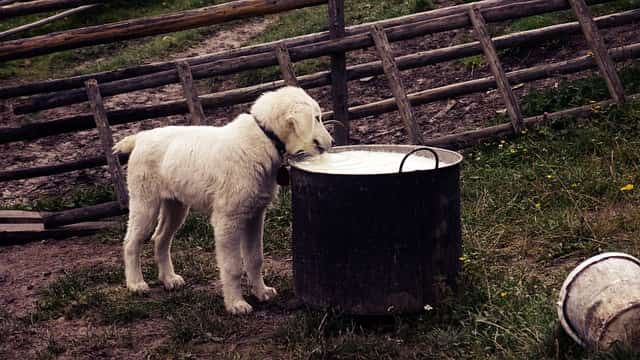
Image by jagdprinzessin from Pixabay
Dogs are known for their love of food, but have you ever wondered why they only eat twice a day? Unlike humans who typically eat three meals a day, dogs have a different feeding schedule that is based on their biology and needs. Understanding why dogs eat twice a day can help pet owners make informed decisions about their dog’s diet and feeding habits.
One reason why dogs eat twice a day is because of their digestive system. Dogs are carnivores and have a short digestive tract compared to herbivores, allowing them to digest and absorb nutrients quickly. This means that dogs need to eat smaller, more frequent meals to maintain their energy levels throughout the day. However, feeding a dog too often can lead to overeating and obesity, which is why two meals a day is a good balance for most dogs.
Another factor that affects a dog’s feeding schedule is their age and activity level. Puppies and younger dogs require more frequent meals due to their higher energy needs and smaller stomachs. As dogs age and become less active, they may need fewer calories and can transition to a two-meal-a-day schedule. However, it’s important to note that every dog is different and may have unique dietary requirements based on their breed, size, and health status.
Dogs’ Digestive System
Anatomy of a Dog’s Digestive System
A dog’s digestive system is designed to break down and absorb nutrients from food. The digestive system consists of several organs including the mouth, esophagus, stomach, small intestine, large intestine, rectum, and anus. The mouth and stomach are responsible for breaking down food into smaller pieces, while the small intestine is responsible for absorbing nutrients. The large intestine and rectum are responsible for absorbing water and eliminating waste.
How Digestion Works in Dogs
When a dog eats, the food enters the mouth and is broken down by saliva. The food is then swallowed and travels down the esophagus to the stomach. In the stomach, the food is mixed with stomach acid and digestive enzymes, which break down the food into smaller pieces. From the stomach, the food moves into the small intestine, where nutrients are absorbed into the bloodstream. The remaining waste products move into the large intestine and rectum, where water is absorbed and waste is eliminated.
The Importance of a Regular Feeding Schedule
A regular feeding schedule is important for a dog’s digestive system. Dogs are creatures of habit and thrive on routine. Feeding them at the same time every day helps to regulate their digestive system and prevent digestive upset. It also helps to prevent overeating and obesity, which can lead to other health problems. A regular feeding schedule also helps to prevent behavioral issues, such as begging and food aggression.
Factors Affecting a Dog’s Feeding Schedule

Image by Mojca-Peter from Pixabay
Age and Life Stage
Different life stages require different feeding schedules for dogs. Puppies require more frequent feeding, usually three to four times a day, because they have smaller stomachs and higher energy needs. Adult dogs, on the other hand, can usually eat twice a day. Senior dogs may have different nutritional requirements and may need to eat smaller, more frequent meals to avoid digestive issues.
Activity Level
The amount of exercise and activity a dog gets can also affect their feeding schedule. Dogs with high energy levels and activity may require more frequent feeding to maintain their energy levels. Sedentary dogs, or those with low activity levels, may need to eat less to avoid weight gain.
Breed and Size
The breed and size of a dog can also affect their feeding schedule. Smaller breeds may require more frequent feeding, while larger breeds may need to eat less frequently but in larger quantities. Different breeds may also have different nutritional requirements, so it’s important to consult with a veterinarian to determine the best feeding schedule for your dog.
Health Conditions
Some health conditions can affect a dog’s feeding schedule. Dogs with certain medical conditions may need to eat smaller, more frequent meals to avoid digestive issues or to manage their condition. Dogs with dental issues may need to eat softer foods or smaller pieces to avoid discomfort.
Benefits of Feeding Dogs Twice a Day
Better Digestion and Nutrient Absorption
Feeding dogs twice a day helps to improve their digestion and nutrient absorption. When dogs eat only once a day, they tend to eat too much, which can lead to digestive issues such as bloating, constipation, and diarrhea. By dividing their food into two meals, the digestive system has time to break down and absorb nutrients more effectively, leading to better overall health.
Prevents Overeating and Obesity
Feeding dogs twice a day can help prevent overeating and obesity. When dogs have access to food all day long, they tend to eat more than they need, which can lead to weight gain and health problems. By feeding them only twice a day, owners can control the amount of food their dogs eat, preventing overeating and maintaining a healthy weight.
Improved Behavior and Training
Feeding dogs twice a day can also improve their behavior and training. When dogs are hungry, they tend to be more focused and responsive to commands, making training sessions more effective. Additionally, by feeding them on a regular schedule, owners can establish a routine that helps to reduce anxiety and stress in their dogs.
Reduced Risk of Bloat
Feeding dogs twice a day can also help to reduce the risk of bloat, a serious and potentially life-threatening condition. When dogs eat too much too quickly, their stomachs can become distended and twist, cutting off blood flow to vital organs. By feeding them smaller meals throughout the day, owners can reduce the risk of bloat and keep their dogs healthy and happy.
Conclusion

While dogs only eat twice a day, it’s important to remember that their dietary needs can vary based on their breed, age, and activity level.
It’s also important to note that some dogs may prefer to graze throughout the day rather than having set meal times. Owners should monitor their dog’s weight and adjust their feeding schedule accordingly.
Overall, feeding a dog twice a day is a common and healthy practice that provides them with the necessary nutrients and energy they need to thrive. Owners should consult with their veterinarian to determine the best feeding schedule and diet for their individual dog.